I photographed two interesting bird behaviors yesterday morning on Antelope Island and at Farmington Bay WMA.
After a full week of stormy weather and very low light my cabin fever finally got the best of me so I decided to go out shooting anyway, despite the continuing poor conditions. It was a morning of photographing scarce and shy birds, mostly at ISO 1600, but I was able to scratch my shooting itch and I did see some interesting behaviors.
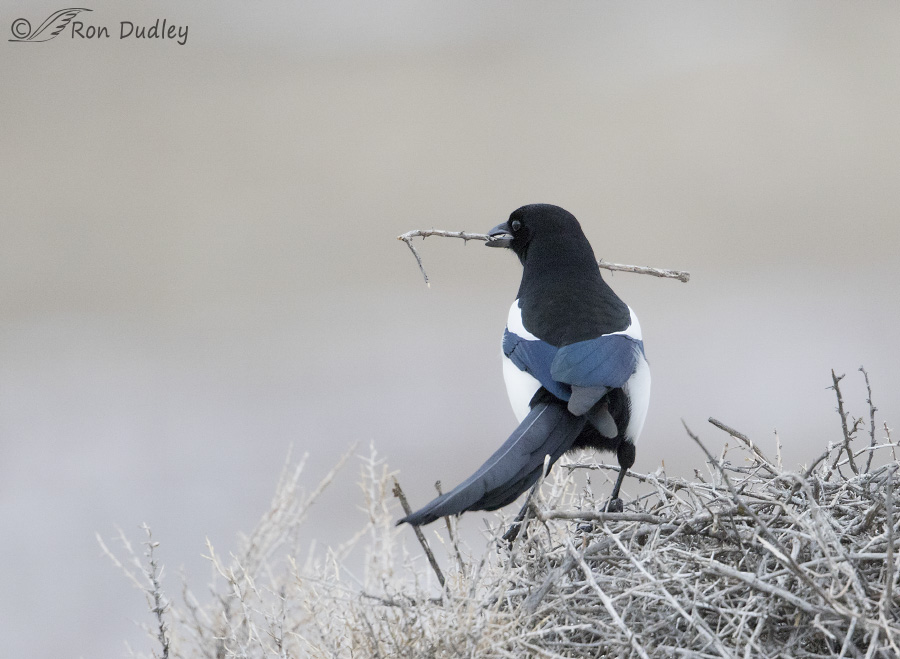
1/2000, f/5.6, ISO 1600, Canon 7D Mark II, Canon EF 500mm f/4L IS II USM + 1.4 tc, not baited, set up or called in
Black-billed Magpies are known as early nesters but I was surprised to see this one with nesting material so early in January. In the past, I believe that late February is the earliest I’ve seen this behavior from magpies. As they often do this bird was refurbishing an old nest rather than building a new one. And there’s no question that the stick was nesting material because I saw the bird work it very carefully and deliberately into the roof of the domed nest that you see on the right.
On the way home from the island I decided to take a quick tour of Farmington Bay WMA just to see what was going on out there. It was pretty slow but I did briefly photograph something that is common around here in January and February but surprises many folks from other parts of the country – Great Blue Herons fishing from the ice. Lots of them.
Many of our Great Blue Herons migrate south for the winter but a number of them usually stick around for the winter at Farmington Bay and elsewhere. They fish from the ice edges as long as they can and if we get periods of complete freeze-over they hunt voles (which they’re very good at). For many folks from more temperate regions that are used to seeing these herons fishing warmer waters it’s a little incongruous to see them ice-fishing.
In this short video clip from yesterday morning we see groups of herons resting far out on the ice and then I zoom in on a closer bird fishing from a hole in the ice. That bird held that position for some time as it waited for prey to appear at the ice hole. The entire scene reminds me of groups of ice fishermen on some of the lakes in Montana and Utah that I’ve seen, freezing their butts off for a chance at a cold, wet and slimy fish or two. Heck, I’ve done it myself, though at this point in my life I’m not sure why…
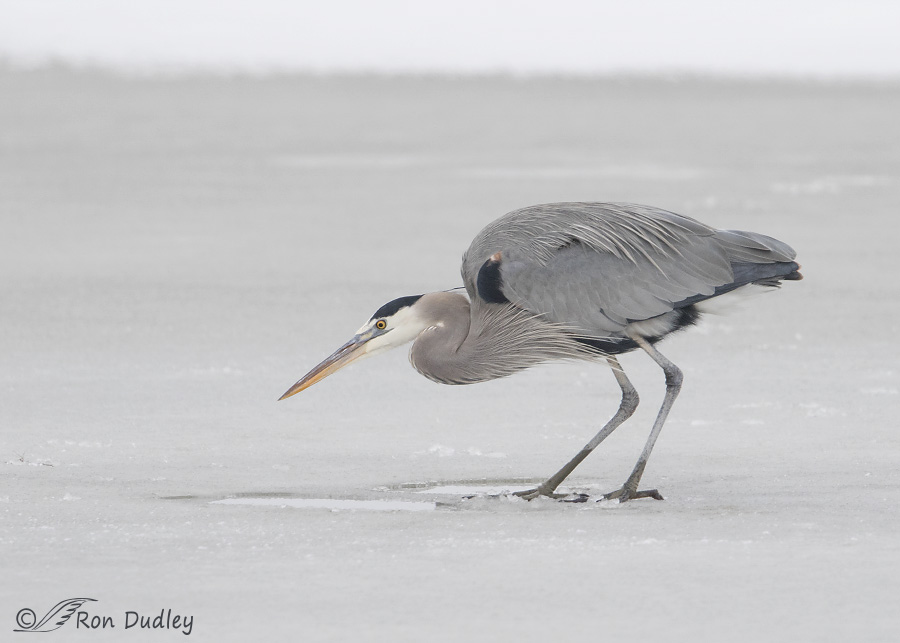
1/1250, f/6.3, ISO 800, Canon 7D Mark II, Canon EF 500mm f/4L IS II USM + 1.4 tc, not baited, set up or called in
This is the same bird we saw toward the end of the video clip. It was very, very patient as it waited for prey. There are two holes in the ice beneath its feet but it seemed to only pay attention to the one on the left – like most ice fishermen they apparently have their favorite hole.
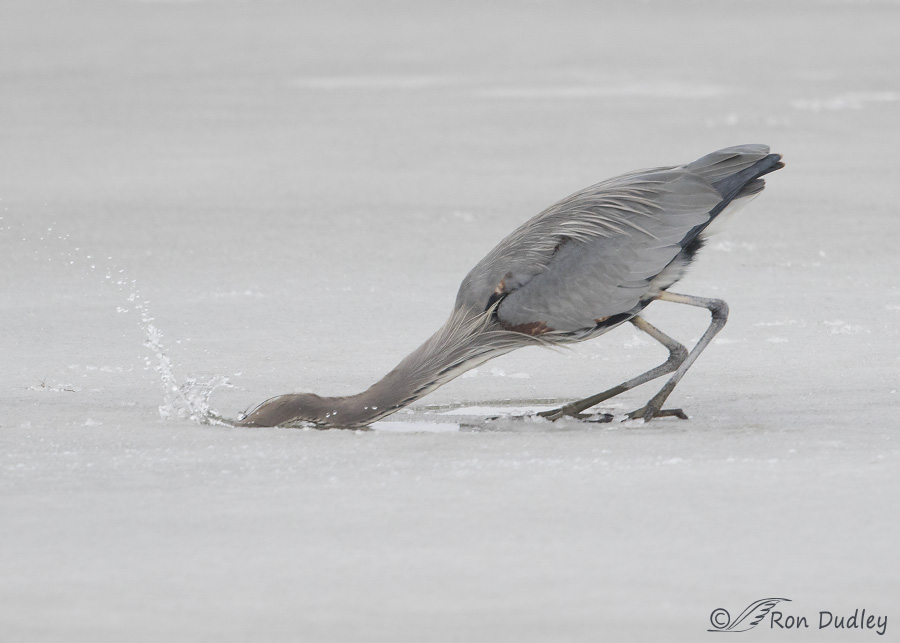
1/1600, f/6.3, ISO 800, Canon 7D Mark II, Canon EF 500mm f/4L IS II USM + 1.4 tc, not baited, set up or called in
At one point the bird struck at something.
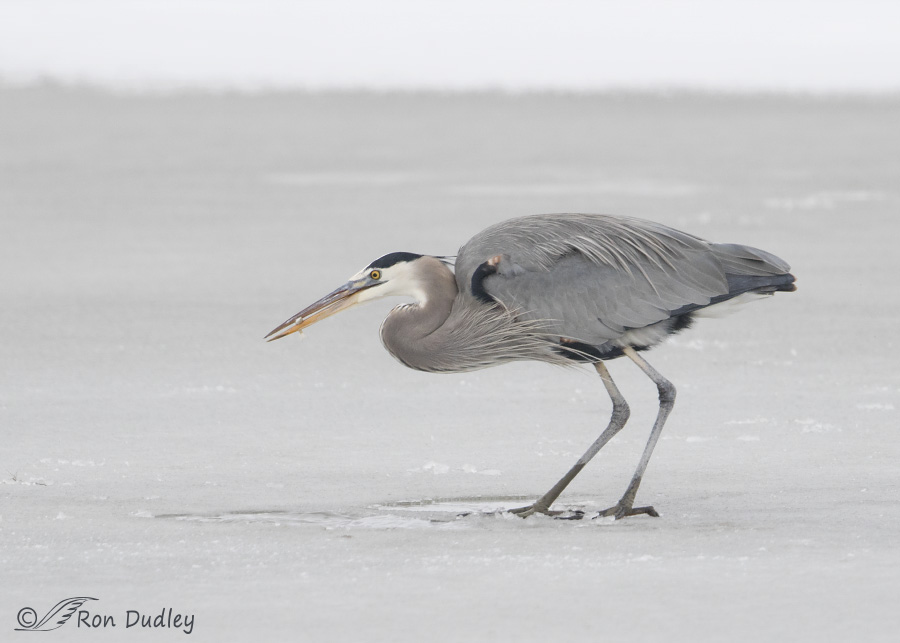
1/1600, f/6.3, ISO 800, Canon 7D Mark II, Canon EF 500mm f/4L IS II USM + 1.4 tc, not baited, set up or called in
But what it came up with was so small I could barely see it…
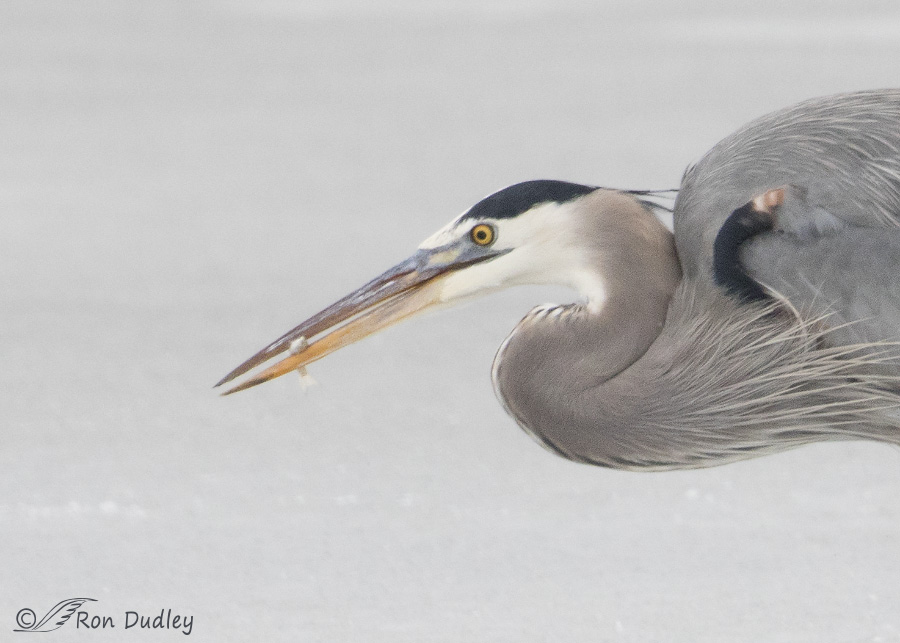
and I had to crop the image heavily to positively identify it as a fish. Sometimes these birds catch huge carp, some so large that they’re too big to swallow, but this tiny morsel hardly seemed worth the effort.
Because of the poor light I didn’t get a single high quality photo the entire morning but as my readers know I’m fascinated by bird behaviors and I always enjoy photographing them, no matter the conditions.
Ron


Great shots and vide Ron!
Charlotte
I’m such a fan of the GBH!
WOW!! I can’t believe that Heron was able to swallow that big fish. He won’t need anything else to eat for some time!!!!
Gluttony personified, Glenn…
How I love that I can learn my first thing for the day without getting up, without even being dressed…
I start my mornings often with your blog, and it is an education and a delight. And frequently the first laugh for the day happens here too.
Ice fishing is such an alien concept for me. And, as Patty said, that teeny, weeny fish seemed hardly worth the effort.
EC, as far as I’m concerned ice fishing will be an alien concept for me too for as long as I live. I prefer dental surgery and hemorrhoids, simultaneously. Deep, bone-chilling cold isn’t my idea of fun (unless there’s bird photography involved…)
A week ago while out at Antelope Island I was parked watching birds along the causeway and a vole casually crossed the road, wandering in a zig-zag line. There was heavy traffic both directions. I cringed every time a car passed not wanting to hear the impending crunch. Remarkably the little bugger made it across the road. It was barely missed by several tires, it seemed unfazed as it stopped and nibbled things it found along the way. On the other hand I was a basket case by the time it safely arrived to the other side.
Fun story, April! In my mind’s eye I can see both you and the vole. Those causeway voles are the main reason we see so many harriers hunting the causeway.
What spectacular photos (again), Ron!! The early nesters get started early And I think this warmer year might have them a bit confused. The GHOs and bald eagles are busily refurbishing here, too. Heck, even the redtails at Cornell are deciding which of their two nests (or another location) would be best for this year’s kids. They’ve worked on refurbishing both of their nests and they’re closing the territorial boundaries, chasing intruders away, escorting them out of (their) town.
And I think this warmer year might have them a bit confused. The GHOs and bald eagles are busily refurbishing here, too. Heck, even the redtails at Cornell are deciding which of their two nests (or another location) would be best for this year’s kids. They’ve worked on refurbishing both of their nests and they’re closing the territorial boundaries, chasing intruders away, escorting them out of (their) town.
As for the ice fishing, who knew? Personally, I’ve thought that not a good and smart thing for humans to do, but just WOW finding herons doing it…that’s just special!
“I’ve thought that not a good and smart thing for humans to do”
That’s exactly my philosophy regarding ice-fishing Laura, at least for me.
Once again, I’ve never seen one of your blogs without learning something new…for example, never knew Great Blues would hang around all Winter, practice ice fishing or eat voles. Laughed out loud at comment (re: ice fishing)’ “…though at this point in my life I’m not sure why”. Close up of great Blue with that tiny fish, underscores how much patience goes into tiny fewards for theses big birds in their struggle to survive. The shot of the Magpie renovating the nest in early Winter makes me wonder what’s going on….
“though at this point in my life I’m not sure why”
Patty, this post brought back memories of my last experience ice fishing – at Flaming Gorge about 1980. It was bitterly cold, the fishing wasn’t very good and 4 of the five of us got wet – 3 fell into the water jumping from the shore out to the ice and one fell into his own fishing hole (one leg, up to the hip). I was the only one who didn’t get wet and I was freezing so it was absolutely miserable for the ones who got wet.
Haven’t been ice-fishing since…
Oh My God, Ron!! For a so-so day these are terrific captures. When I moved to Florida, I especially loved seeing all the Blue Herons, Great White Egrets and both White and Brown Pelicans since never saw them in Michigan!! I would give my eye teeth to come close to your skill as a photographer. The beauty and wonderful behaviors you capture just make my daily mornings!! Oh, by the way, I watched a NatGeo special on Yosemite and I got to see my 1st “live” vole!!! They are cute, but as they said in the special if it wasn’t for the bobcats, coyotes and raptors who “lunch” on them, the park would be over run with rodents!!
Jo Ann, voles are pretty neat but dang are they ever hard to photograph unless they’re already in the beak or talons of a raptor. They often appear right under my pickup window as I’m photographing birds but they almost never stay out in the open (for very good reason) for more than a second or two.
You’re absolutely right Ron. I’ve given up trying to ID the little rodents Jack catches. By the time I get there, the mouse/vole/shrew/whatever is either gone (eaten) or eaten enough that there aren’t any ID parts left, so I just call them field mice and I’m done with it. It’s a little easier with the Cornell hawks since they bring them for baby food and you usually get a good look at them before Mom feeds them to the kids.
It’s a little easier with the Cornell hawks since they bring them for baby food and you usually get a good look at them before Mom feeds them to the kids.
Can’t tell you how many times I’ve tried to photograph them, Laura. They always scurry off a split second before I get focused on them. I have very few photos of them and all of them are of poor quality.
Ron, your videos are a great as your photos and then I can really see the behaviors. Thanks so much. Diana
Thanks, Diana. My video skills are sadly lacking to nonexistent but I’m working on them. I was somewhat surprised that video is a whole new ballgame compared to still photography. Live and learn…
Ice fishing and hunting for voles are something I’d never heard of in Great Blue Heron’s either! Of course, they are a summer time bird here. Glad you took the pictures and “scratched your shooting itch” a bit. Don’t know that the magpies are building here yet(plenty of them around) but the Great Horned Owls are “nest shopping” and very vocal right now.
Of course, they are a summer time bird here. Glad you took the pictures and “scratched your shooting itch” a bit. Don’t know that the magpies are building here yet(plenty of them around) but the Great Horned Owls are “nest shopping” and very vocal right now.
Judy, yes, GHO’s are also known for early nesting. It always makes me wonder how they do it when I think of the farm owls in Montana (that I photograph during summer) beginning nesting activities in January when it’s often 20-30 below up there. Or colder…
Gives a different connotation to ice fishing – at least they don’t have to wait till the red flag goes up!
Very interesting behavior – never knew that Great Blues did that. Thanks for the new behavior lesson!
“at least they don’t have to wait till the red flag goes up”
Ha, that made me smile, Dick.
And when the water all freezes over it’s fascinating to watch them hunt voles in the snow. They adapt to survive…
Heron fishing on ice, never knew they would do that, thank’s.
You’re welcome, Steven. It’s actually fairly common behavior around here in winter.